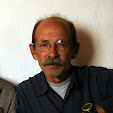Speaking earnestly, Hasan draws a triangle in the air as we sit in a trendy sidewalk tea house. He, Ahmet and I all smile as we glance at a shapely young woman walking by. He takes a sip of tea and lights another of many cigarettes. The mass of society is the base of the triangle, he explains. The force of the “system” is pulling them further from the apex of true Islam. He draws a straight line up the middle of the triangle. He and few others in Turkey are ascending.
We are in southeastern Turkey, the historic and cultural center to the country's 15-20 million Kurds. The conversation is in Kermanji, the dominant Kurdish dialect, which Ahmet ably translates.
What made this and several other conversations somewhat remarkable is that Hasan is an imam, a local Islamic spiritual leader who leads worship services at a mosque. He is equally comfortable citing Frederick Nietzsche and other philosophers as he is the Qoran. The potential for collision between the two is evident in the practical world, but not in Hasan's beliefs. He sees enlightenment, not conflict.
Hasan is anxious to tell his story. I said I would try.
For example, he continues, the Qoran says that a woman divorced by her husband must wait 4 months and 10 days before she can remarry. Why? Because 1,300 years ago this was the amount of time needed to determine whether or not a woman was pregnant. But now? The technology has changed and the same information can be determined in one month. The Qoran provides for such evolution of thought, Hasan insists. Other imams reject such thinking as the Qoran is considered by Muslims to be the immutable words directly from God.
How did this come to be? Hasan is a handsome 36-year old Kurd with an easy smile that begins in his soft eyes. Aways impeccably dressed, he carries himself with ease and confidence, far from the stereotypical views of imams we have in the West. I expected a dramatic tale of family and politics, but found instead a man's searching.
Earlier in the afternoon we visited his parents' home in a tall modern apartment building near the city center. His mother has been ill for a year. “My mother is my life,” he said slowly in English. The two share the same open and soft eyes. Family had gathered, as they often do. Hasan's wife and one of his three children, his only sister (he has five brothers as well), an aunt with her husband, mother-in-law … all relaxed and comfortable with me joining the assembly in reception room.
The mood changed 45 minutes later, after we had coffee, and then tea with “zabet,” a pastry filled with fried curds. Hasan's father had entered the room. The women left and the men stood, kissing the 78-year old father's hand. We left shortly thereafter.
“I do not feel feel for my father as I do for my mother,” Hasan said later. His father is also an imam, as was his grandfather, and beyond. “Although my father is a renown expert in the Arabic language, my father thinks like a villager,” he continued. All of his brothers had left the city because of his father, and his mother's illness is indirectly his fault as well, Hasan believes.
Hasan was the only son to be sent to a madressa (a school that stresses Islamic teachings), a decision that he did not object to as a 12-year old, and still does not regret. He completed 6 years in the madressa, and then began his university-level studies. It was then his father suggested he become an imam. Hasan warmed to the idea. He passed the standard State-administered exam, much like an engineer and other professionals must, became “licensed,” and subsequently a State-employed imam.
The next day I visited him in the small mosque in the basement of the public hospital where he was assigned. It is a narrow room with thread worn green carpet, looking more so in the flourescent lighting. A few men were leaving after the afternoon prayer. We in turn went to a simple tea house in the old part of the city to continue our conversation.
“To be an imam is just a job (Ewîya jî karekê.)” Hasan said. He thinks that in Turkey perhaps only 10 percent of imams are committed to their spiritual role. But he continues to return to the “system” in Turkey. Since its founding in 1923 and with intent the State has insidiously eroded Muslims the ability to think. They now are religious serfs who reject all logical thinking. The triangle and Neitzcshe.
Although he deeply believes in Islam, Hasan is frustrated. Nobody listens to his ideas. He wants to stop being an imam, which is entirely possible in the Turkish system. But the State salary affords him the means to support his family.
“Do you think your knowledge of Islam has made you a better man?,” I ask. “True Islam,” he qualifies, “Yes.”
“Do you think your knowledge of Nietzcshe has made you a better man?” “Yes,” he says with equal conviction.
“Are you sure you want me to write this story?” “Yes. It will be your gift to me.”









Rob, this is one of the most insightful and enlightening blogs of yours that I have read. I wish Hasan success and blessings. I really enjoyed the progression of the stories. It makes me want to learn and read more. You give it such a great human perspective. Good job and hope you enjoy the rest of your trip. Thanks for the opportunity of being able to share in a small way the scope of what you are experiencing in your travels and personal education. More comments when I hopefully get to see you in person. This contributes to "global warming" on a person to person basis.
ReplyDeleteSuzan in Michigan